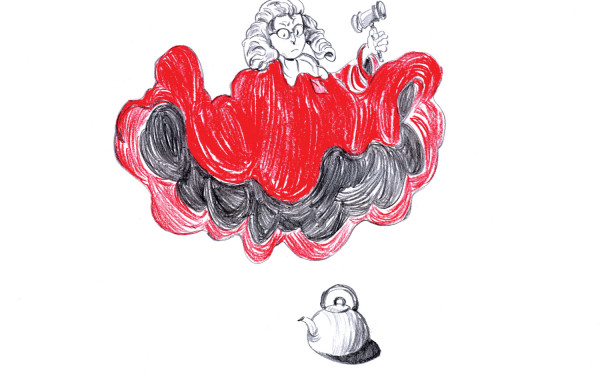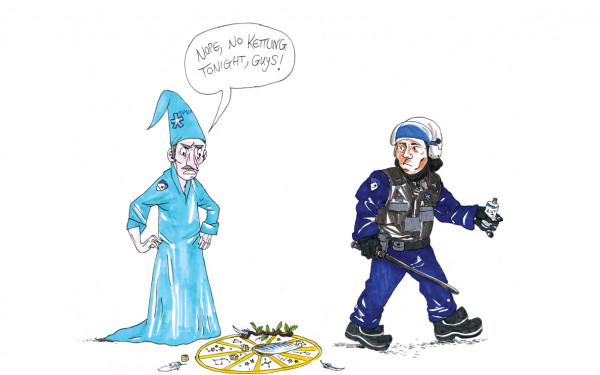Kettling, Enforcement of Bylaw P-6 Prove Controversial
Montreal Facing 8 Class-Action Lawsuits over Treatment of Protesters by Police
Protesters feeling wronged by allegedly heavy-handed police responses during six demonstrations held between June 2012 and March of this year will soon have their day in court.
On Aug. 22, Quebec Superior Court judge Stéphane Sansfaçon authorized eight class-action lawsuits against the city of Montreal over police officers’ handling of the protests.
The lawsuits can thus now proceed on behalf of 1,610 ticketed protesters that were purportedly mistreated by police, even if they’re not explicitly named in the complaint.
Authorization of the lawsuits was the first step in what could become a prolonged court battle with $21 million in damages at stake. They were authorized simultaneously because of similarities in the facts and questions raised by each case.
Labour lawyer Sibel Ataogul, who is representing the plaintiffs in the lawsuits, said that the facts vary somewhat from protest to protest, but that they deal principally with demonstrations during which Montreal police made mass arrests through a tactic known as kettling, which consists of surrounding and confining protesters in a small area.
Depending on the protest, Ataogul says demonstrators were held between one and six hours in such a manner.
“[The protesters] couldn’t get any water. They were either stuck in the cold or in the heat, depending on the day of the protest. They were filmed and photographed without their consent on numerous occasions,” she told The Link.
The lawsuits are condemning both the arrests themselves and the conditions of detention. Not only was people’s right to protest violated, but the Service de police de la Ville de Montréal also stripped protesters of their dignity, Ataogul said.
“If you were stuck for six hours in a kettle, pressed up against other people, and if you had to go to the bathroom and they don’t let you go […] I don’t know if you’d find that pleasant, but most people don’t,” she said.
“I can only hope that if these allegations prove to be true and the courts feel that these are not justified ways of holding people and treating people who are basically getting tickets […] that it changes the tactics that are applied and that we go […] back to before the kettles when people could protest peacefully in Montreal without being afraid of being treated this way.”
Ataogul said she expects the court case to take “upwards of a year or two” to be heard.
Enforcement of Bylaw P-6
Most of the protests specified in the lawsuits ended with participants receiving a fine under municipal bylaw P-6, which was amended at the height of the 2012 student protests to prohibit demonstrators from wearing masks “without a reasonable motive” and to require that an itinerary be submitted to police for any “assembly, parade or other gathering” taking place on public property.
Contravening the bylaw can result in a fine from $500 to $1,000 for a first offence. The bylaw has proven controversial, touted by some as a means of keeping the peace and by others as an infringement on civil liberties.
“We think certain provisions of P-6 are unconstitutional and illegal, and therefore we should not have been arrested in the first place,” said Julien Villeneuve, the plaintiff in one of the lawsuits.
Villeneuve, a CEGEP philosophy professor, became the unofficial mascot of the student movement when he began attending protests in 2012 under the name Anarchopanda, donning a panda costume. He said the bylaw is “absurdly broad” and can be applied to virtually any public gathering.
“Right now, in the city of Montreal, any group of three or more people that do anything in the public domain should be reporting to the police what they’re doing, which is, of course, ridiculous,” he said.
“The police can’t enforce that, wouldn’t enforce that […] but what it allows them [to do] is to cherry-pick what is allowed, who they target and don’t target.”
One protest tackled in the lawsuits—a demonstration held on June 7, 2012—ended with no tickets being issued under the bylaw, according to Ataogul.
“People were held in a kettle and then let go, they didn’t even get a ticket,” she said.
In addition to participating in these lawsuits, Villeneuve is also challenging the constitutionality of bylaw P-6 in court.
The case, brought forward in 2012 through the same law firm as the lawsuits, was originally supposed to be heard in the fall of 2013, but Villeneuve said it was delayed when he amended his request for a judgment on the bylaw’s constitutionality to include information on protests held in 2013. The case will now be heard in December.
Villeneuve said protesters might want to wear masks of recognizable politicians to draw attention to their policies or a scarf to simply stay warm in the winter. He also noted there are good reasons why not all protests can provide an itinerary to police, noting spontaneous protests as an example.
Another problem is that the bylaw forces activists to organize in certain ways, with a top-down leadership having to decide on a protest route and then enforcing it, according to Villeneuve.
“It forces us to become our own police,” he said.
What’s more, Villeneuve feels police officers’ strong-armed enforcement of the bylaw, as in the case of the protests mentioned in the lawsuits, is “wrong and unnecessary,” particularly when it involves tactics like kettling.
“We must remember that a P-6 ticket is the equivalent of a parking ticket, it’s a municipal bylaw,” he said.
“We didn’t kill anybody. Imagine how fast you would have to go on the highway and how dangerous of a driver you’d have to be to get a $600 ticket. All we’re doing is walking on the street […] and having a normal, peaceful protest.”
CORRECTION: The original version of this article stated that “a demonstration held on March 15, the most recent one tackled in the lawsuits, ended with no tickets being issued under the bylaw.” In fact, it was at a protest on June 7, 2012 that no tickets were issued. The Link regrets the error.

_900_597_90.jpg)



_600_375_90_s_c1.jpg)
